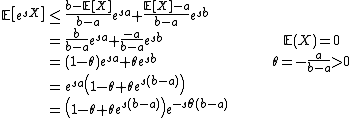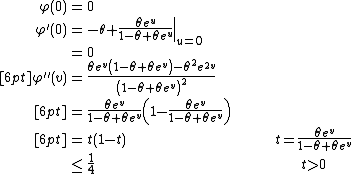- Statement of the lemma
- A brief proof of the lemma
- More detailed proof
- See also
- Notes
In probability theory, Hoeffding's lemma is an inequality that bounds the moment-generating function of any bounded random variable.[1] It is named after the Finnish–American mathematical statistician Wassily Hoeffding.
The proof of Hoeffding's lemma uses Taylor's theorem and Jensen's inequality. Hoeffding's lemma is itself used in the proof of McDiarmid's inequality.
Statement of the lemma
Let X be any real-valued random variable with expected value  and such that
and such that  almost surely. Then, for all
almost surely. Then, for all  ,
,
Note that because of the assumption that the random variable  has zero expectation, the
has zero expectation, the  and
and  in the lemma must satisfy
in the lemma must satisfy  .
.
A brief proof of the lemma
Since  is a convex function of
is a convex function of  , we have
, we have
So, 
Let  ,
,  and
and 
Then,  since
since 
Taking derivative of  ,
,
for all h.
By Taylor's expansion,

Hence, 
(The proof below is the same proof with more explanation.)
More detailed proof
First note that if one of  or
or  is zero, then
is zero, then  and the inequality follows. If both are nonzero, then
and the inequality follows. If both are nonzero, then  must be negative and
must be negative and  must be positive.
must be positive.
Next, recall that  is a convex function on the real line:
is a convex function on the real line:
Applying  to both sides of the above inequality gives us:
to both sides of the above inequality gives us:
Let  and define:
and define:
 is well defined on
is well defined on  , to see this we calculate:
, to see this we calculate:
The definition of  implies
implies
By Taylor's theorem, for every real  there exists a
there exists a  between
between  and
and  such that
such that
Note that:
Therefore,
This implies
See also
- Hoeffding's inequality
- Bennett's inequality
Notes
- 2014 in Vatican City
- 2014 in Venezuela
- 2014 Invictus Games
- 2014 in video games
- 2014 in video gaming
- 2014 in Vietnam
- 2014 in Wales
- 2014 in Women's Artistic Gymnastics
- 2014 in women's road cycling
- 2014 in World Series of Fighting
- 2014 in Yemen
- 2014 in Zambia
- 2014 in Zimbabwe
- 2014 Iowa Barnstormers season
- 2014 Iowa Corn Indy 300
- 2014 Iowa elections
- 2014 Iowa gubernatorial election
- 2014 Iowa Hawkeyes football team
- 2014 Iowa State Cyclones football team
- 2014 IPC Athletics European Championships
- 2014 IPC Athletics European Championships – Men's 100 metres
- 2014 IPC Athletics European Championships – Men's 1500 metres
- 2014 IPC Athletics European Championships – Men's 200 metres
- 2014 IPC Athletics European Championships – Men's 400 metres
- 2014 IPC Athletics European Championships – Men's 5000 metres










